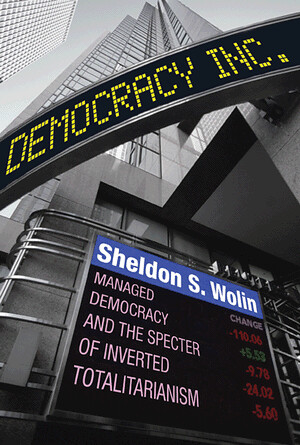"How?"
Good question.
(Book cover from Sheldon S. Wolin's "Democracy Inc." (2008, Princeton University Press; original image and new 2010 edition of the book are available at www.press.princeton.edu/titles/9175.html)
I never claimed it would be easy. The problem began in 1886 when corporations were anointed by the Supreme Court of the United States as "people" and they've had nearly 125 years to get to this point. And I will admit, it may be too late to put the genie back in the bottle. Globalization has created a worldwide economic dependency on cheap trade; our country and others have shredded old tariffs and regulations that served quite well for decades; transnational non-state corporate actors are beholden to no particular government (much less possess a sense of "national pride"); and as Sheldon S. Wolin puts it in his book "Democracy Inc.", a sort of "inverted totalitarianism" has been instituted in the United States and other countries that doesn't use force to get it's way as in the bad old 20th Century, but instead relies on the apathy and perceived helplessness of the populace to do what it wants. And the "it" in that sentence doesn't even have a face, as old-fashioned totalitarianism did; it is an amorphous blob of largely anonymous corporations, their paid-for political public faces, and constant media disinformation and entertaining distractions.
Before any effective effort can be made to eliminate the forces of "inverted totalitarianism", however, the first target must be to raise awareness and break the hold on the minds of the populace, who have been lulled into a frustrating but paralyzing sense of apathy, a "that's just the way it is, you can't do anything about it" mentality. We all know that this mentality has been broken before many times in our history, and it can be broken again, but we're up against a foe that is by comparison almost supernatural in power. Corporatism pervades every aspect of our lives, is largely unseen and unfelt, and yet is all around us, all the time. We have become so dependent upon the fruits of corporatism, that we can only perceive it now when those fruits are taken away. It seems insurmountable for mere individuals to wrest control of their lives back from these seemingly invincible "super-persons".
There are ways to fight back, though. And these ways use the one advantage we have over the corporation: we are individuals, capable of both individual and group action at the local level.
One suggestion (buy local and avoid the big corporations) often sounds pie-in-the-sky, but it actually works, as long as we get enough people to buy from businesses and farms in our own communities. Even then, we're helping the big corporations, because the local businesses have to get their products, bank loans or fertilizers from somewhere (usually eventually tracking back to China and Indonesia), but it's a start.
Other ways we can fight corporatism is to work to get anti-corporate leaders into local elected seats. Try for higher offices too, but don't worry too much about those until we have city councils, county boards, local judges, etc. who will fight corporatism and stand up for their local businesses again. When you have tens of thousands of small communities push back against the big corporations across the country, we'll see some changes at the national level, and to some extent worldwide.
And as city and county anti-corporatism takes hold, it will be easier for it to spread to state legislatures and executives and eventually to the national level. As more state and local judges are selected who fend off corporate attacks and set local precedents, those may also filter up into the federal courts, first in the districts, then appellate, then perhaps the SCOTUS. No matter at what level, though, precedents in law will be set that will serve as the sand around which the pearl will be formed, until one day, perhaps in another 125 years, we will finally overturn the last of the "corporations as people" rulings and we'll be free of corporatism once and for all.
But that's just here in the U.S. We created this mess, and it's spread like a cancer worldwide. So as we're doing this locally, we have to work to change trade agreements (we can do this at a local level as well, at first, and work up), we have to rebuild regulations, we have to work to re-establish worker-based unions (many of the big unions today have become as bad as the big corporations... the elites run them just as they run the corporations, the government, and the courts).
Corporatism, just like globalization, isn't "all bad". There are good aspects to them as well. Globalization does help "flatten" the economies of the world (much as I hate to agree with Thomas Friedman), and does serve to raise living standards in developing countries. Corporatism in and of itself isn't bad; it provides economies of scale that allow us to accomplish things unheard of a century ago. But both of these, allowed to operate with no regulation or controls, is destroying local communities, local businesses, and local jobs. It is a madness that simply must stop before the last tree is cut down and the last frog goes extinct, and before the planet is completely uninhabitable.






